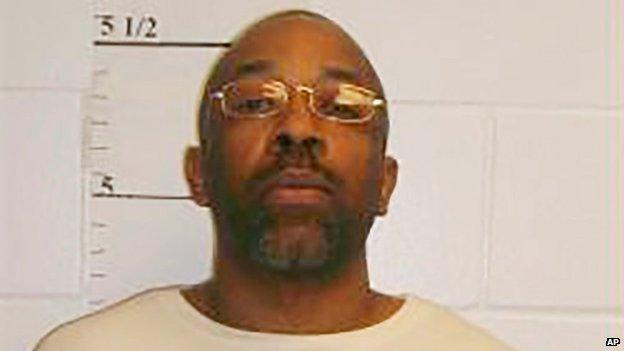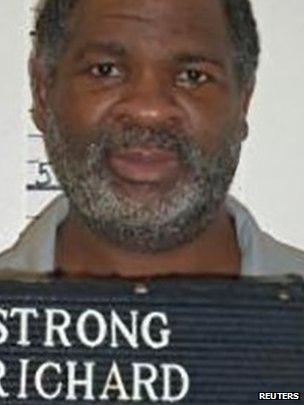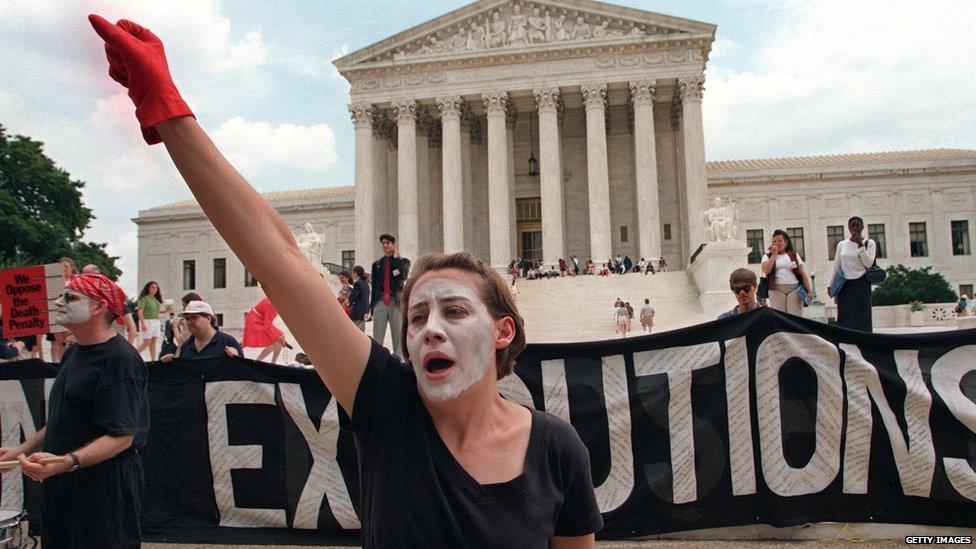For one Missouri lawyer, eight clients executed in 18 months
- Published

On Tuesday, Roderick Nunley became the sixth death row inmate executed by the state of Missouri in 2015
At a time when other states in the US are backing away from the death penalty, Missouri has done the opposite. It is currently executing its death row inmates faster than any other state in the country, at a rate of about one per month.
At 21:09 local time on Tuesday evening, Roderick Nunley became the sixth death row inmate executed by the state of Missouri in 2015. He was convicted of the 1989 kidnapping, rape and murder of a 15-year-old girl in Kansas City. His was the latest in a string of executions by the state since 2013.
In May 2015, Nebraska became the 19th state , externalto abolish the death penalty. A federal appeals court in California is currently considering the constitutionality, external of capital punishment. Difficulty procuring the drugs necessary for lethal injections has halted the process in some places.
But while executions have slowed elsewhere, Missouri is ramping up, ever since it secured a new, secret source for the execution drug pentobarbital, external.

"They execute people no matter what," Jennifer Herndon told the Marshall Project
Lawyer Jennifer Herndon's caseload is a testament to that fact. Of the last 18 men executed by Missouri, eight of them were her clients. Nunley was her final capital case.
No one in Missouri has had more executed clients in the last two years. In part because of this, she was profiled by The Marshall Project, external in an article entitled "The Burnout". In the story, Herndon - known once as a dedicated lawyer who won a landmark decision that said individuals who committed their crimes while juveniles can not be executed - said she no longer wanted to represent death row inmates. At the time, Nunley and another man named Richard Strong were still alive. Strong was subsequently executed in June this year.
"I'm not doing anybody any good," Herndon told the news outlet, external."There's no joy in it whatsoever. They execute people no matter what."
Missouri capital defence attorneys Lindsay Runnels and Jennifer Merrigan were shocked by what they read about Herndon in the story. They did not realise that her law licence had been suspended for a time in 2013 because she was delinquent on her taxes to the tune of tens of thousands of dollars.
The article also went into depth about her second job as a business coach and online marketer, external. In the days leading up to Nunley's execution, they tried to convince the Missouri Supreme Court that Herndon did not fulfil her legal obligations to him by failing to find his original trial files and by commenting to media that only a "miracle" , externalcould save him.
They say the problem is systemic.
"It's the same lawyers over and over and over again, Ms Herndon among them. We are involved in every execution," says Runnels. "We're outgunned and out-resourced. And then there is competency problems with some of the bar."

Richard Strong was another death row client of Herndon's
Merrigan - who helped Herndon back in 2010 with Nunley's case - has defended several death row clients, and says Herndon's caseload coupled with her tax trouble show a lawyer not able to devote significant time to clients whose lives hang in the balance.
Merrigan says working on even a single execution case is a tremendously draining experience for capital defence lawyers.
"Even for a person who is not in serious financial trouble, who has not taken another full-time job, it is still extremely stressful," she says. "To say that somebody has had eight executions over the past 18 months, that means they've spent approximately six months in this type of crisis litigation. It's completely unreasonable to believe anyone could operate that way."
Together, Runnels and Merrigan filed affidavits last week with the Missouri Supreme Court and a motion asking it to halt the execution so that Nunley could be properly represented. They had many concerns beyond the ones revealed in the Marshall Project article, including the fact that Herndon allegedly never tracked down Nunley's original trial file.
According to her affidavit, Runnels says Herndon told her it was stolen, then later admitted she "didn't ever check with the trial attorneys" for the files.
"Mr Nunley received mental health treatment as early as 1978...Mr Nunley was 'never the same' after his brother died suddenly as a child...he had suffered at least two gunshot wounds," wrote Runnels in her affidavit. "These red flags and potential lines of humanising and mitigating information were never developed. Additionally, no life history chronology has ever been completed for Mr Nunley nor has any in-depth social history ever been done. "
These types of investigations are crucial, says Sean O'Brien, associate law professor at the University of Missouri-Kansas City, in order to show "a unique and complex human being who deserves mercy".

The use of certain execution drugs has been brought to the US Supreme Court
That, he says, is the "heart and soul" of the work of capital defence lawyers trying to convince a jury to hand down a life sentence instead of death. He says it takes a huge amount of time and is accomplished mostly pro bono after funding dries up over the years it takes for death penalty cases to be resolved.
"A good lawyer wouldn't find herself appointed on seven death cases," he says. "No lawyer could do that. No lawyer could financially survive that."
The Missouri Supreme Court overruled Runnels and Merrigan's motion. A half hour before his execution would be allowed to proceed, final appeals to the US Supreme Court sent by Herndon were denied, and Runnels and Merrigan submitted their final writ to the US Supreme Court.
"Ms Herndon appears to lack the time and capacity to competently represent Mr Nunley," they wrote. "She also claims to no longer want to do capital defence work and claims to not be able to conduct the work her clients require."
Herndon declined BBC's interview request on Tuesday. "I'm busy with my client," she wrote in an email.
O'Brien says with the tiny defence bar, the wave of executions and the pro-death penalty politicians in power in Missouri, there is a "perfect storm" raging in the state.

Nebraska recently ended its death penalty but there is a petition movement to resinstate it
In March of this year, four lawyers who served on the American Bar Association's Death Penalty Assessment Team wrote that the Missouri Supreme Court should only allow lawyers to have a client facing execution once every six months. One of them was the group's co-chair, University of Missouri School of Law associate dean Paul Litton.
"It is obviously increasing the chances of due process denials," he says of the pace of executions. "We're talking about a time where we're seeing not just fewer executions in general, we're seeing fewer juries sentencing people to death every year."
Litton's recommendations were not taken up by the Missouri Supreme Court and the executions have continued at roughly the same pace.
Shynise Nunley Spencer, Nunley's daughter, also submitted an affidavit to the Missouri Supreme Court on behalf of her father before he was executed.
"Despite the ongoing, close relationship that my father and I share, I have never, not once, spoken with Jennifer Herndon. She has never called me. She has never returned my calls," Spencer wrote. "The simple truth is that I love my father and talk to him almost everyday. My children love my father. His death will be devastating for me and for them."
After the US Supreme Court denied the final petition, Roderick Nunley was given a lethal injection at 20:58 and died 11 minutes later. He gave no final statement. Missouri Governor Jay Nixon reminded the public of Nunley's crime in a press release announcing he had denied Nunley clemency.
"On the morning of March 22, 1989, 15-year-old Ann Harrison was waiting for the school bus at the end of the driveway of her Raytown home when she was abducted, raped, and then stabbed to death by Roderick Nunley and Michael Taylor. The capital punishment sentence given to Taylor for his role in these brutal crimes was carried out last year," Nixon's statement reads. "Nunley also pleaded guilty to these heinous crimes and was sentenced to death. My decision today upholds this appropriate sentence."
Herndon did not respond to subsequent interview questions about whether she will ever represent a capital client again.
Another execution is scheduled in Missouri for next month.